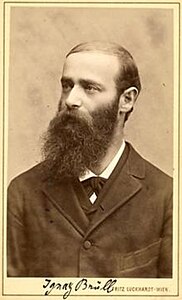The golden cross
| Work data | |
|---|---|
| Original title: | The golden cross |

Ignaz Roar |
|
| Shape: | Opera in two acts |
| Original language: | German |
| Music: | Ignaz Roar |
| Libretto : | Salomon Hermann Mosenthal |
| Literary source: | Mélesville : Cathérine ou La croix d'or |
| Premiere: | December 22, 1875 |
| Place of premiere: | Royal Opera House Berlin |
| Playing time: | approx. 2 ¼ hours |
| Place and time of the action: | Village near Melun, 1812 and 1815 |
| people | |
|
|
The golden cross is a German-language opera by Ignaz Brüll in two acts. The world premiere took place in Berlin in 1875 and was a sensational international success.
Work history
The opera premiered on December 22, 1875 with great success in the Royal Opera House in Berlin. Lilli Lehmann took on the lead role and appeared as Christine . Howler received personal compliments of Kaiser Wilhelm I . The opera was shown on more than 180 stages, including London's Carl Rosa Opera Company in 1878 and New York's Metropolitan Opera , where it was performed in 1886.
In reviews from the 19th century, the opera was performed together with Bizet's Carmen , Goldmark's Die Königin von Saba , Hermann Goetz The Taming of the Shrew and Nessler's The Pied Piper of Hameln . Ignaz Brüll was an Austrian pianist and composer who was associated with Johannes Brahms in Vienna . The Golden Cross is his second and at the same time most important opera. The libretto was written in German by Salomon Hermann Mosenthal , who also wrote the libretto for Otto Nicolai's Die Lustigen Weiber von Windsor . The opera is based on a story by Mélesville that includes an emotional drama during the Napoleonic Wars.
action
To prevent her brother Nicolas from being called up by Napoleon's troops, Christine promises to marry the man who will take his place. Gontran de l'Ancre, a young nobleman, takes over the duty without revealing his identity to Christine. As a token of her loyalty and as a token of appreciation, she sends the stranger a golden cross. Gontran, who was badly wounded in battle, gives the cross to Sergeant Bombardon, who brings it to Christine. At first Christine believes that he is her brother's savior, but is then informed of Gontran's fate by Bombardon. The confusion of her feelings reaches its climax when Gontran returns a short time later as an invalid. Christine in particular feels obliged to her vows, but duty and affection are ultimately united.
Trivia
The National Socialists had banned the performance of the play.
Individual evidence
- ↑ Isidore Singer, Joseph Sohn: Ignaz Brüll. In: Jewish Encyclopedia. Retrieved September 15, 2018 .
- ↑ a b c R. Wiesinger: Ignaz Brüll. In: Austrian Biographical Lexicon. November 30, 2015, accessed on September 15, 2018 (German).
- ^ Lars Franke: Hermann Goetz, Der Widerspänstigen Zähmung, Study Score (Munich: Musikproduktion Höflich, 2003). 11 + 283pp. np. In: Nineteenth-Century Music Review. June 2007, pp. 168–175 , accessed on September 15, 2018 (English).
- ↑ Tim Parry: (The) Romantic Piano Concertos - 20. In: Gramophone . 1999, accessed September 15, 2018 .
- ↑ The golden cross. Boosey & Hawkes , accessed September 15, 2018 .